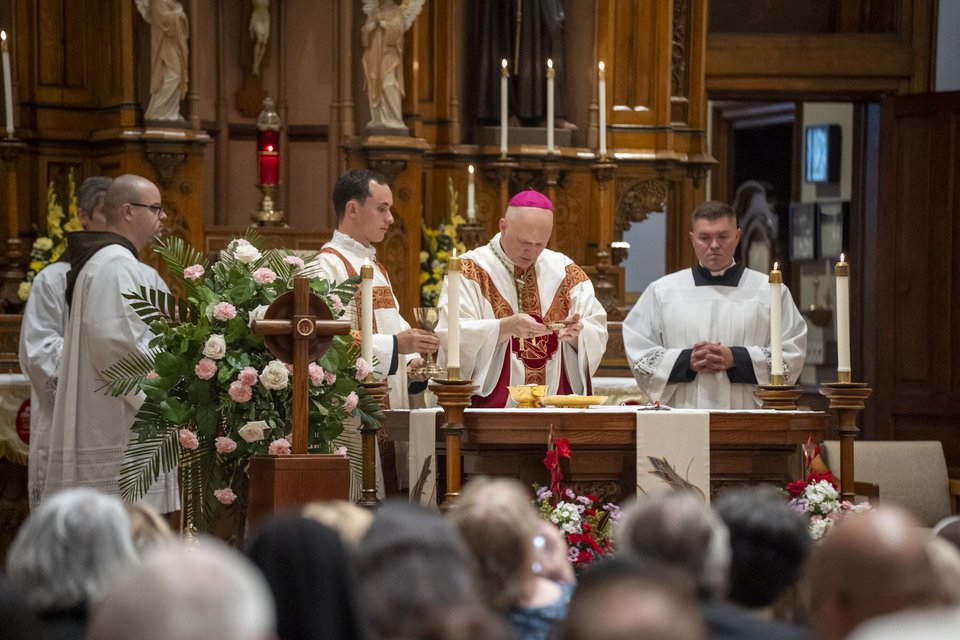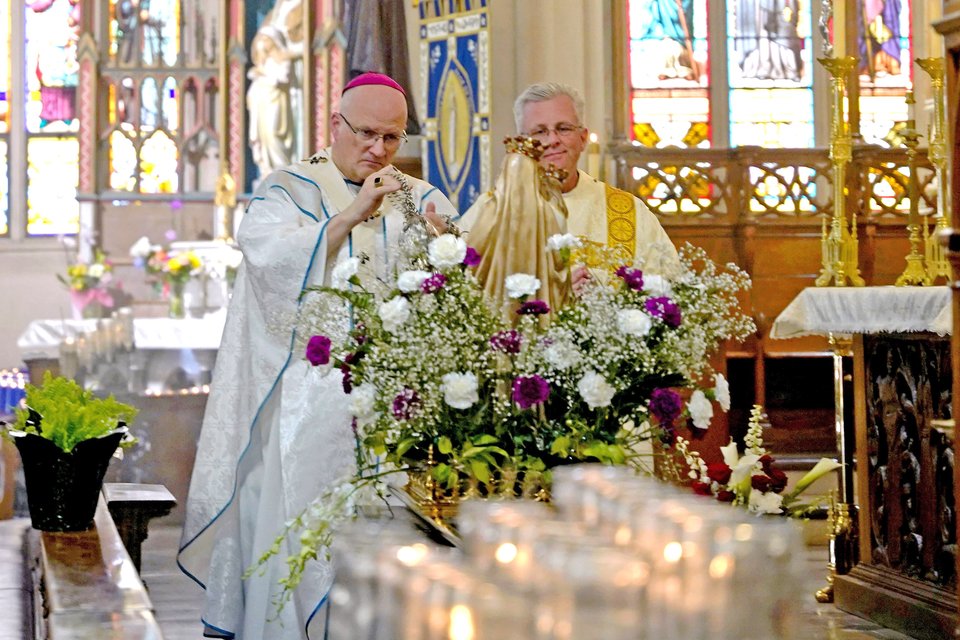On the eve of the Sacred Triduum, chief shepherd reflects on the Holy Spirit's power to transform the Church for God's glory
DETROIT — Priests, deacons and bishops processed into the Cathedral of the Most Blessed Sacrament on Thursday, April 6, to celebrate the Chrism Mass — the final Mass before the Triduum begins, starting with the Mass of the Lord's Supper on Holy Thursday evening.
Archbishop Allen H. Vigneron blessed the sacred chrism and other holy oils, which will be used to consecrate the faithful first during the Paschal vigil, and then for the rest of the year.
The Chrism Mass, which gathers priests, deacons and bishops together for one liturgy, “is among the principal manifestations of the fullness of the Bishop's Priesthood and is considered to be a sign of the close bond of the Priests with him,” according to the U.S. Conference of Catholic Bishops.
“From all parts of the diocese, the Holy Spirit has brought us here this morning, so that we might exercise that priesthood and be joined with Jesus our head as he consecrates the sacred chrism and blesses the oil of the catechumens and the sick so his life will be in abundance in our midst,” Archbishop Vigneron said during his homily. “We have, then, a great office, a great work, a great service to perform this morning.”
In reflecting on the sacred liturgy and the act of consecrating the oils — themselves an instrument of consecration — Archbishop Vigneron explained the profound paradox of consecration.
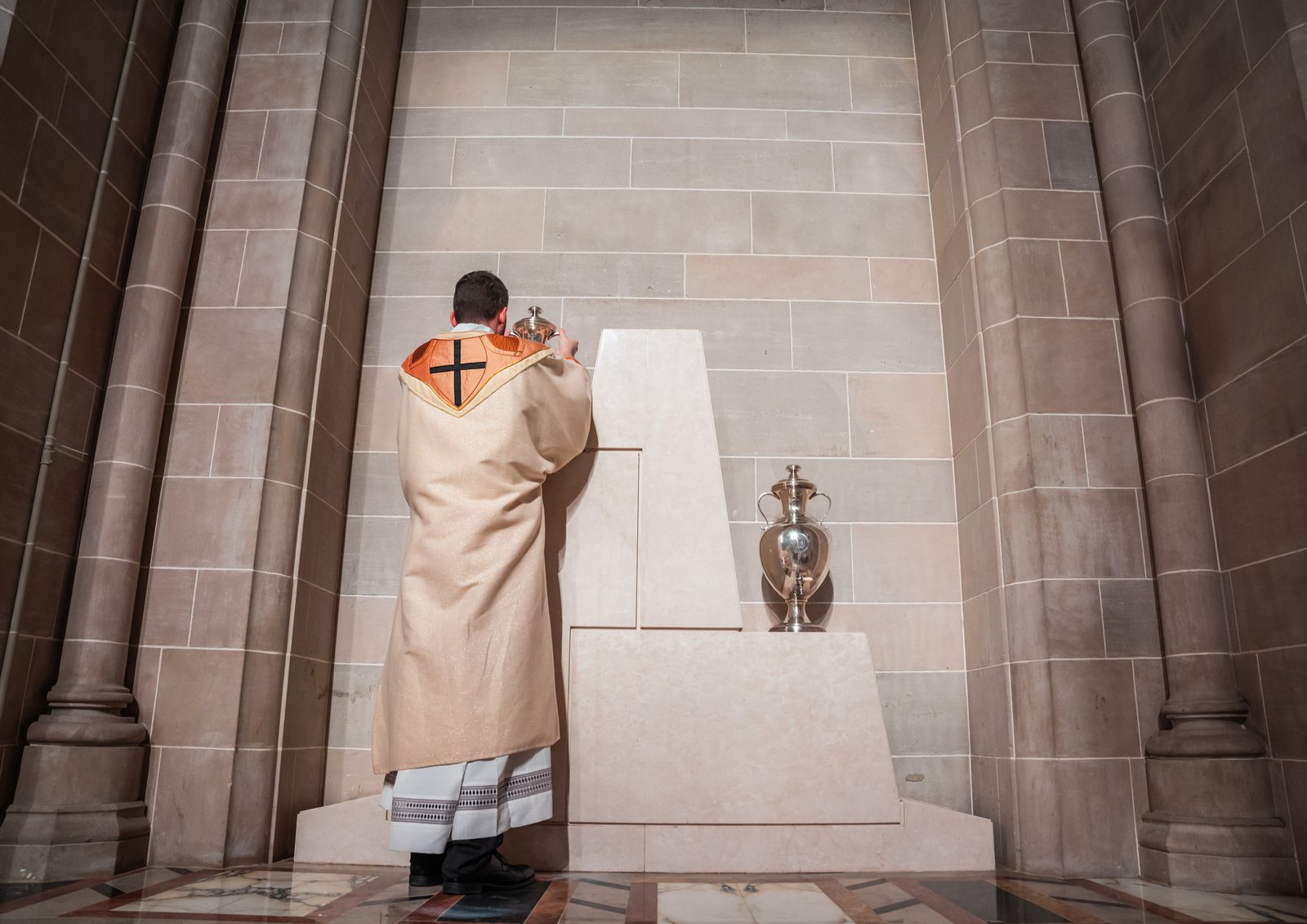
“Jesus, being anointed with the Holy Spirit, means that Jesus is being sent. This is a very profound pairing: being anointed and being sent on mission,” Archbishop Vigneron explained. “In the economy of salvation, these two belong together.
"Being anointed and being missioned are clear from the words of Jesus himself," the archbishop continued. "You remember Jesus speaks of himself as the one whom the Father has consecrated and sent into the world. Then, when Jesus speaks of himself and his disciples at the Last Supper, these are words of his prayer: ‘As you sent me into the world, Father, so I sent them into the world, and I consecrate myself for them so that they also may be consecrated in truth.’”
Jesus consecrated and sent his disciples on mission, and, in turn, his disciples sent and consecrated others, thus uniting themselves and others to Christ, the archbishop said.
“Being consecrated and being sent, there is no one without the other. No one is consecrated who is not sent, and no one can be sent unless he or she be consecrated," Archbishop Vigneron explained. "And so, once we are made totally over to God, the all-holy one ... we are made agents of His kingdom, missioned to proclaim the good news as it was for Jesus, as he, in turn, made it for the twelve, so it is true for us.”
The world was snatched out of God’s hands by the evil one after he succeeded in seducing Adam and Eve, the archbishop said. Now, the Church's members are consecrated to the mission of renewing and restoring God’s world.
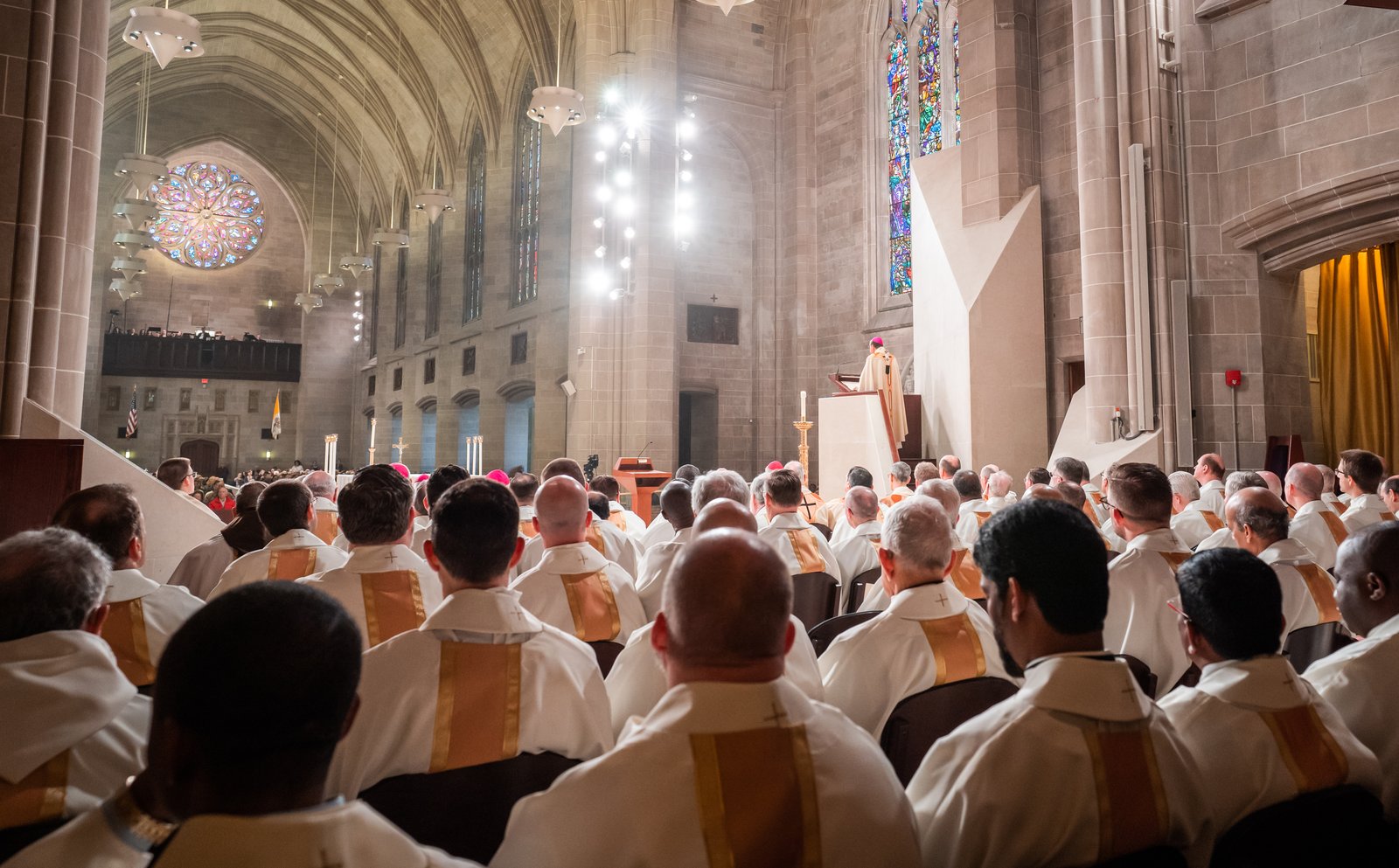
“This is why we understand that priests at ordination are anointed with the sacred chrism … to show that we are given over completely to our identity with Christ, especially in his role as head and shepherd of the Church, sharing in his mission of forming a priestly people who can consecrate the world to the Father along with him,” Archbishop Vigneron explained. “It’s why altars and churches are anointed with the sacred chrism, because our churches are places where the sacred Passover feast is celebrated, and our altars are the tables on which the sacrifice of the priestly people are offered.”
Further, the holy oils are also blessed to strengthen the sick and catechumens for their mission and to consecrate them to God’s glory and renew them by the Holy Spirit, he added.
“The Holy Spirit is the means of consecration always and everywhere. It was the Holy Spirit who overshadowed the Virgin Mary and made present in her womb the son of God, consecrated in the flesh for the mission of salvation,” Archbishop Vigneron said. “It is the Holy Spirit who descended on Jesus after his baptism to consecrate his humanity in its fullness so he would take up the mission of his public life, leading ultimately to the fulfillment of his mission in Jerusalem in these days.
"And so, it is the Holy Spirit who consecrates our chrism today and who blesses the other oils," he continued. "Pray then, brothers and sisters, with great thanksgiving that the Holy Spirit is not gone from the Church. The Holy Spirit keeps the Church alive. He brings us our consecration and our mission so that the kingdom of God will continue to grow.”
Archbishop Vigneron solemnly noted that soon after the homily, he would call his brother priests to renew the acceptance of their ordination consecration — an ask he knows comes with great sacrifice and self-offering.
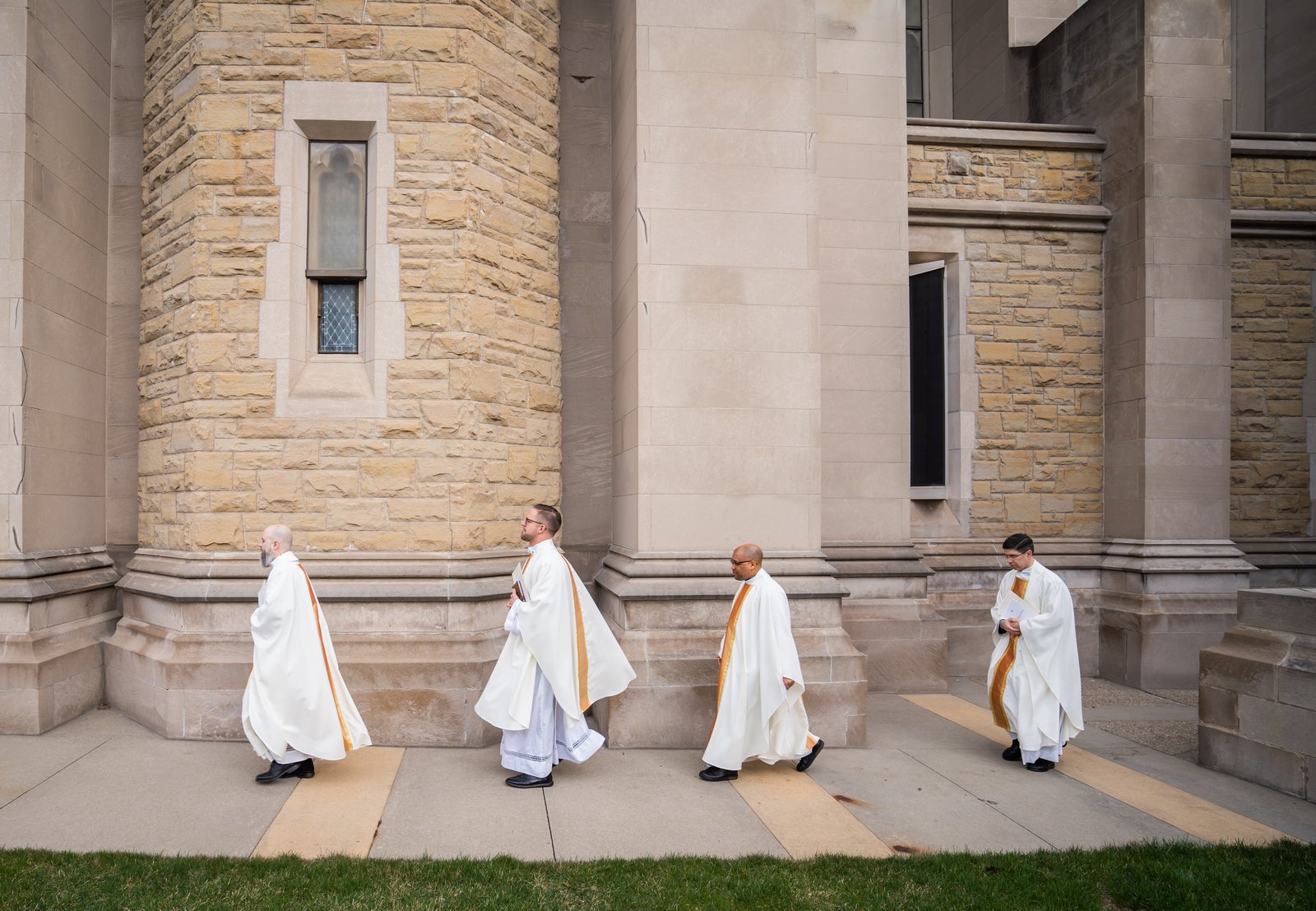
While it is simple to speak the responses, it is not simple to live them, Archbishop Vigneron added, acknowledging that the new way of ministry in the Archdiocese of Detroit since the establishment of Families of Parishes has been a sacrifice for his brother priests.
“I am very much aware that I have asked all of you brother priests to make a sacrifice of yourself in taking up a new way to be about our parochial ministry, and I am very grateful for your generosity,” Archbishop Vigneron said. “I don’t ask you for this sacrifice simply or naively, but do believe that it is for the salvation of souls and for our own good as a presbyterate, and so as you renew your promise, I want to say how grateful I am to God that the Holy Spirit is at work in your life.”
As it becomes increasingly difficult to live out the priestly mission, Archbishop Vigneron prayed that his fellow priests would be renewed in their enthusiasm to serve God and His Church — a renewal that flows first through the holy Eucharist.
“The holy Eucharist is the reason for which there is the chrism, for which there is the oil of the catechumens and the oil of the anointing," Archbishop Vigneron said, "so that we will indeed be a priestly people already in this world, offering ourselves along with Christ to the Father and having a foretaste of what it will be to have joy for all eternity.“
Copy Permalink
Feast days


